The AAN Brain Health Summit 2024 Proceedings Summary
General Event Summary Overview
The 好色先生 hosted the third annual Brain Health Summit in Washington, DC, in September. The event empowered stakeholders from across disciplines to showcase advancements, make connections, share ideas, and act on the top priorities toward advancing brain health for all. The 150 attendees included neurologists and other medical practitioners, academic and clinical researchers, legislators, public health civil servants, patient advocacy organizations, industry partners, payers, and more.
The AAN Brain Health Summit consisted of a full day of keynote speakers, group discussions, and open forums. Featured speakers highlighted their expertise and collective work in promoting brain health across the individual lifespan, in the AAN's focus areas of science, patient care, public policy, and public education. Attendees participated in two breakout group discussions related to brain health public policy and reducing health disparities.
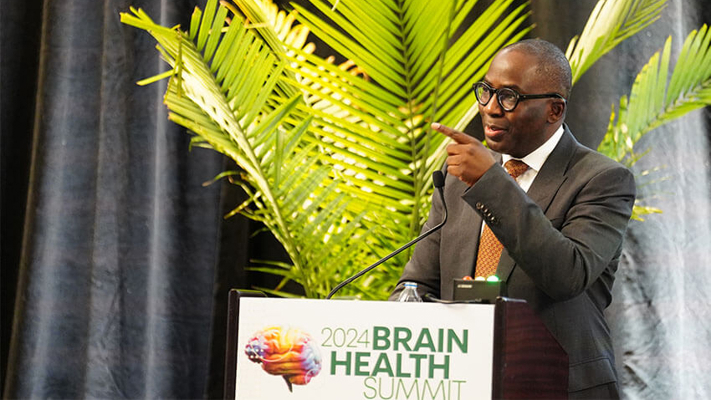
Keynote speaker Olajide Williams, MD, MS, Hip Hop Public Health, presents the Hip Hop Stroke intervention.
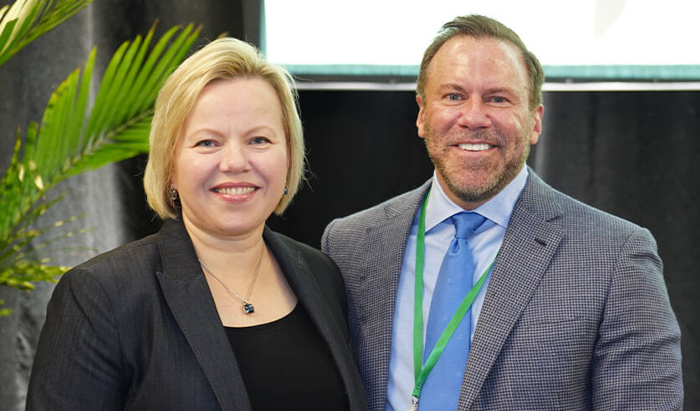
AAN Brain Health Committee (BHC) Co-Chairs, Chair, David A. Evans, MBA, (right) and Vice Chair, Natalia S. Rost, MD, MPH, FAHA, FAAN (left) co-hosts of the third annual AAN Brain Health Summit.
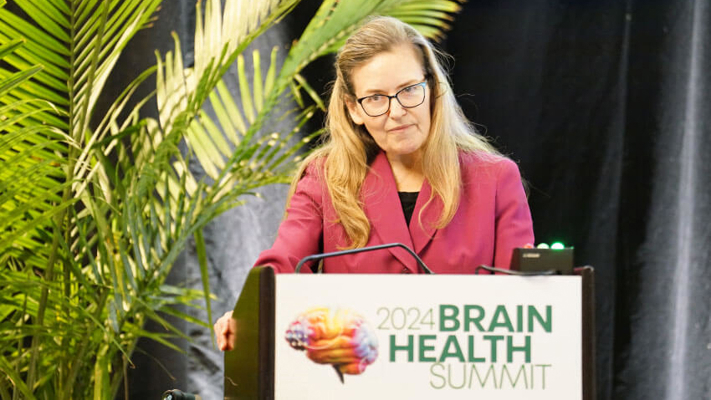
Keynote speaker former US Congresswoman Jennifer Wexton shares a policymaker's perspective in addition to her personal experience living with progressive supranuclear palsy.
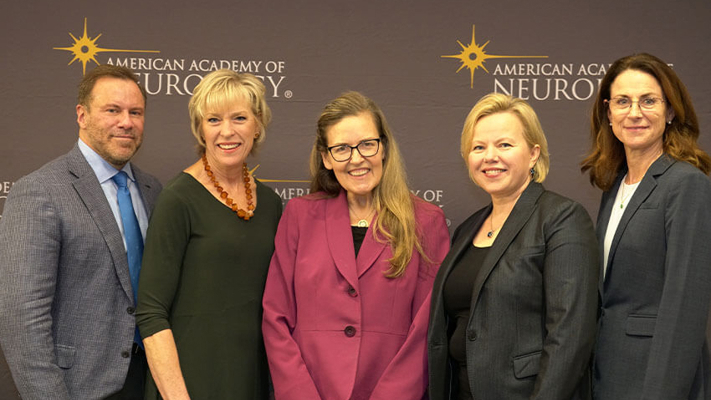
From left to right, David A. Evans, MBA; AAN President Carlayne E. Jackson, MD, FAAN; former US Congresswoman Jennifer Wexton; Natalia S. Rost, MD, MPH, FAHA, FAAN; AAN CEO Mary Post, MBA, CAE.
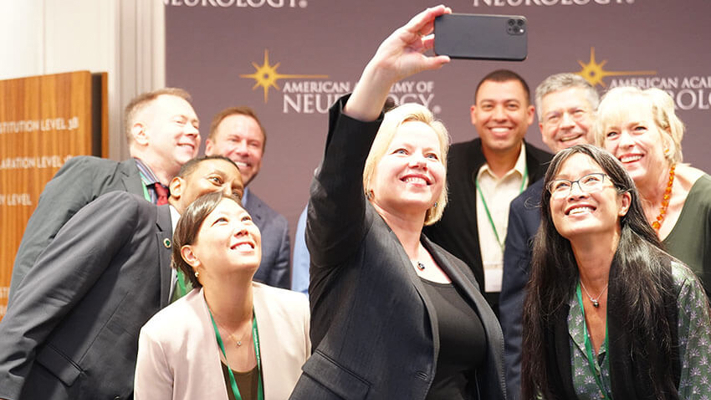
AAN Brain Health Committee Vice Chair, Natalia S. Rost, MD, MPH, FAHA, FAAN, captures a selfie with other AAN leaders.
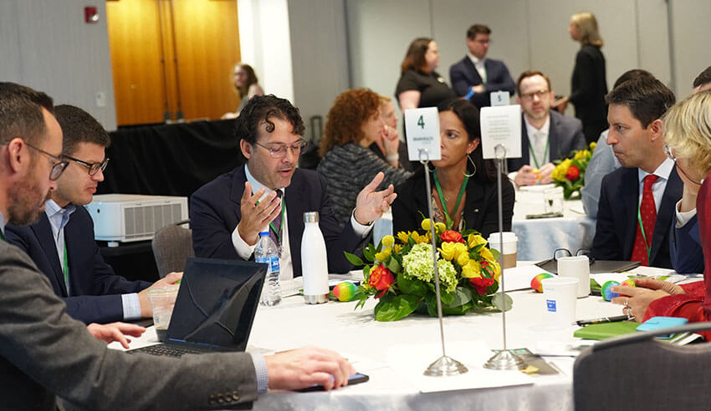
Keynote speaker and AAN Brain Health Committee member Daniel J. Correa, MD, MSc, FAAN, (third from the left) facilitates group discussion among fellow summit attendees on addressing health disparities.

AAN President Carlayne E. Jackson, MD, FAAN, (second from the right) participates in group discussion with fellow summit attendees about communicating the value of brain health.
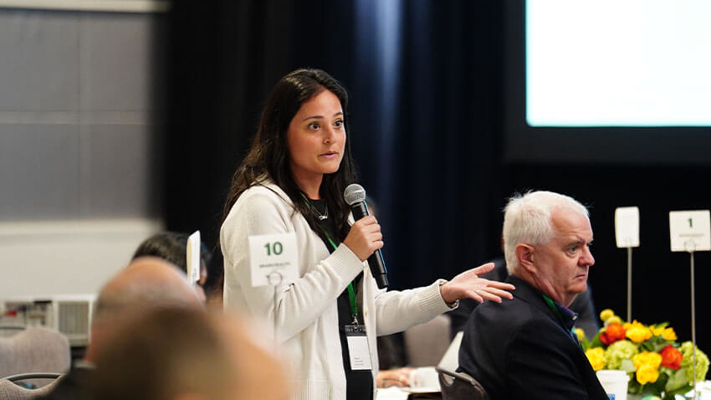
Summit attendee Jennifer Pollack, JD, Alzheimer’s Association, asks a question during a Q&A session with brain health keynote speakers.
Priorities Highlighted in Participant Discussions
As a part of the agenda, attendees participated in two different breakout group discussions. During the first breakout group discussion, attendees were asked to work together to identify critical actions to demonstrate the value of brain health to policy makers. Key takeaways include:
- Further invest in more high-quality brain health data collection, including well-designed preventive studies with data standards
- Harness the power of quality data with storytelling to communicate the value of brain health
- Expand the National Brain Health Awareness Day and provide education outreach to state and local government to form networks and partnerships for program implementation
- Develop and implement preventive brain health curriculum for children, youth, and adolescents
- Develop and advocate for an appropriately reimbursed preventive brain health visit during each stage of life
During the second breakout group discussion, attendees were asked to work together to identify action ideas to reduce health disparities to achieve brain health for all. Key takeaways include:
- Fund community-based brain health educators and care navigators to target regions with high disparities
- Fund community-based participatory research to develop health literacy campaigns
- Collaborate with schools and faith communities to “democratize science” and share information
- Develop multidisciplinary health risk assessments to measure maternal/fetal brain health for every child born
- Conduct brain health screenings throughout childhood
The highlighted priorities are those identified by individual summit attendees and do not necessarily represent the views of all meeting participants or the 好色先生.
Summaries of Keynote Speaker Presentations
Laura Baker, PhD, Wake Forest University School of Medicine
Baker presented a large two-year US POINTER lifestyle intervention trial, and lessons learned about design and implementation of the study for older adults at risk of cognitive decline and dementia. Risk reduction is a focus, given the 2024 Lancet Commission report indicated up to 45% of dementia cases could be prevented by addressing modifiable risks. US POINTER enrolled over 2,000 at-risk adults into two interventions differing in structure and intensity, and focused on increased physical and cognitive activity, nutrition, social engagement, and monitoring of health metrics. Top-line results will be reported in July 2025. Lessons learned to inform broader program development for communities across the US included importance of strong community partnerships to ensure program success, need for adaptable recommendations that meet diverse and changing needs of older adults, and trained teams with expertise to facilitate sustained behavior change toward a healthier lifestyle.
Daniel José Correa, MD, MSc, FAAN, Montefiore/Albert Einstein College of Medicine
In his presentation, “Addressing Community Health Through Public Health 好色先生 and Developing the Next Generation of Physicians and Neurologists,” Correa highlighted the growing burden of neurological disorders and the importance of health education in addressing this challenge. This emphasized the need to improve integration of neurological care into primary health care systems, along with addressing health disparities through community engagement and professional pathway programs. He advocated for increased funding and collaboration among educators, policymakers, providers, and communities to support health education, research, and programs that address health disparities and improve access to care. Across the health system, he called for collaboration among educators, policymakers, care providers, and communities to shape the future of health care. He explored examples from the Bronx and Albert Einstein College of Medicine, discussing multiple pathway programs from middle school to career, which aim to prepare future health care leaders from marginalized communities to address health disparities.
Andrea Edlow, MD, MSc, Massachusetts General Hospital
Maternal immune activation can be the result of diverse environmental exposures, ranging from obesity to viral infection to substance use. Maternal immune activation impacts the developing fetal brain and may impact males and females differently. Fetal and infant brains remain inaccessible during pregnancy and after birth, so we need better ways to identify children at greatest risk for adverse neurodevelopmental outcomes. More precise identification methods will facilitate intervention during key developmental windows. The placenta may mediate the impact of maternal immune activation on the fetal brain. A specialized population of placental immune cells may serve as a biomarker for fetal brain malprogramming.
Kate Gillespie, PhD, MPH, Institute for Health Metrics and Evaluation
Gillespie presented highlights of new work focused on geographic disparities in health care utilization and spending in the US. The work has yielded comprehensive estimates stratified by age, sex, health condition, type of care, payer, and geographic location (3,100 US counties in 50 states and DC), which are well-suited for secondary analyses aimed at highlighting patterns and outliers. In line with the goals of the summit, Gillespie illustrated how these estimates can be leveraged to enable states to identify specific diseases or places of care where the disconnect between burden and spending is highest and to maximize health outcomes with each dollar spent.
Sarah Lenz Lock, JD, AARP
The AARP joined forces with the AAN and others to establish the Brain Health Action Collaborative, a multi-year, multi-sector initiative aimed at promoting brain-healthy lifestyles. If we are going to improve brain health and neurological care, we must work together to reduce the stigma associated with cognitive decline and dementia and make it easier for people to adopt and sustain brain-healthy behaviors. The collaborative particularly seeks to engage communities affected by systemic inequities and higher rates of cognitive decline.
Rebecca Moreau, Epilepsy Foundation Texas
Moreau of the presented the local grassroots advocacy and legislative journey of "," legislation signed into Texas state law in June 2019. It ensures school personnel are trained in seizure recognition and first aid, creating safer environments for Texas students living with epilepsy. The Epilepsy Foundation’s Texas affiliates provide free trainings to Texas public schools. The legislation is named in honor of Samantha Watkins, a high school senior who passed away due to a fatal seizure. The Epilepsy Foundation is implementing in all states.
Ted Thompson, JD, The Michael J. Fox Foundation for Parkinson's Research
Signed into law in July 2024, the National Plan to End Parkinson’s Act is the first federal law dedicated to diagnosing, preventing, treating, and curing Parkinson’s disease. This milestone represents nearly two years of advocacy by The Michael J. Fox Foundation and partner organizations. Tens of thousands of people joined the push to pass the bill, including those living with Parkinson’s as well as families and caregivers. More than 1,000 of those advocates met directly with congressional offices to urge their support. Another key strategy was identifying and working with the members of Congress with personal connections to Parkinson’s.
Jennifer Wexton (D-VA), US Congresswoman
Wexton delivered a keynote speech highlighting her experience serving northern Virginia for more than two decades as a prosecutor, attorney, advocate for abused children, and state senator. In Congress, she has successfully worked across the aisle to better the lives of Virginia’s children and families. Since her progressive supranuclear palsy (PSP) diagnosis, Wexton has become an outspoken advocate for better treatments, cures, and disability rights. Wexton championed the National Plan to End Parkinson’s Act, a historic step in battling Parkinson’s and related diseases like PSP, which was signed into law by President Joe Biden. Wexton also introduced the bipartisan HEALTHY BRAINS Act to step up research on environmental factors of neurodegenerative diseases.
Olajide Williams, MD, MS, Hip Hop Public Health
Building health literacy and sparking behavior change are key steps toward alleviating health care disparities. The example presented was low acute stroke treatment rates, and the relationship between low stroke literacy (ability to recognize stroke symptoms, knowledge of the time-dependent nature of acute stroke treatment, self-efficacy for appropriately calling 911) and out-of-hospital delays to treatment. Williams presented the Hip Hop Stroke intervention1—an entertaining multi-sensory digital curriculum leveraging the popularity of hip-hop music—as an evidence-based model for increasing families’ stroke literacy through their school-aged children using the child-mediated stroke communication2 framework.
References:
1. Williams O, Leighton-Hermann Quinn E, Teresi J, Eimicke JP, Kong J, Ogedegbe G, Noble J. Improving community stroke preparedness in The Hip Hop Stroke Randomized Clinical Trial. Stroke. 2018; 49: 972–979.
2. Williams O, DeSorbo A, Noble J, Gerin W. Child Mediated Stroke Communication: Findings from Hip Hop Stroke. Stroke. 2012; 43:163-169
The next AAN Brain Health Summit will take place in the fall of 2025. Please contact brainhealth@aan.com with any questions.